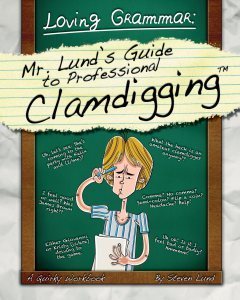Loving Grammar with Steve Lund
Taking a bit of a break from the world of fiction with this blog post to interview the man who not only taught me everything I know about grammar, but also inspired my love for classic literature and of course, William Shakespeare. He also happens to have a brand new book out called��Loving Grammar: Mr. Lund’s Guide to Professional Clamdigging.
Steve Lund was my high school English teacher. ��You could probably say he was something of a celebrity at Lutheran High School of Dallas (now known as Dallas Lutheran School). ��Everyone, even the middle schoolers who had yet to take his classes, knew about the infamous “Lund Papers” and the enigma known as “Clamdigging.” ��Mr. Lund has us writing college level papers in eleventh grade, and I’ve got to tell you, his classes are the reason I never stressed out over a paper in college. ��University-assigned papers just weren’t a big deal to me, and all of my former high school classmates agree. ��It was all thanks to Mr. Lund and yes, grammar friends, it was all thanks to Clamdigging.
It is my honor as a published author and as a student of the humanities to welcome Mr. Steve Lund to my blog.
Hi, Mr. Lund! ��Tell my readers a little bit about yourself.��
Ok, over 40 years ago, a favorite teacher of mine in college (Dr. Prausnitz���I wrote a little limerick about him years ago.*) told me that he thought I���d make a good teacher.�� I remember saying to him������How do you know that?���
His maddeningly mysterious reply: ���I know.���
Well, as a result of a recommendation for teaching assistantships that Prausnitz put out there for me–without my knowledge–I started in 1972, teaching college students English when I was 21 years old, and it didn���t take me long to realize that teaching is what I love to do.�� So Prausnitz was right after all.�� And I���ve taught the best music and lit on the planet to HS, college, university, retirement people (and even���for one semester���a prison class), and it has never gotten old.�� I���ve gotten old, but my love for teaching is ���younger than springtime��� (to mint a new phrase).�� What I love���besides just hanging out with curious people���is taking fiendishly difficult subjects���grammar, sonata-allegro form of classical music, poetry, Joyce and Faulkner, Shakespeare, foreign languages���and making them absolutely learnable for everyone.�� That���s what lights my inner bulb!
*There once was a prof at CC
Who lectured and sang on TV,
But the networks got scared��
And calling it merde
They made it a late late at 3.
What inspired your love for teaching grammar?��
I shouldn���t say this in broad daylight, but I have always liked grammar and languages���even diagramming sentences although I would never inflict that painful exercise on my students.�� (Diagramming sentences is the equivalent of cutting your lawn with scissors.) Transformational grammar (Chomsky) was fun too!�� Honestly, my grammar/writing/teaching skills were honed teaching international students for quite a few years.�� One Saudi wrote this:�� ���*When I come to United States I was Washington, DC for two weeks.����� Okay, anyone want to know why we have prepositional phrases?�� No matter how painful it is to learn prep phrases, it is still easier than ���being Washington DC��� for two weeks.
What exactly IS Professional Clamdigging?��
Professional Clamdigging is finally getting the chance to learn and master something that you never thought you���d ever get���something that matters, by the way.�� Maybe you thought that everyone else learned this but you didn���t and never will.�� The problem with having this attitude about grammar/writing is that it can haunt you the rest of your lives���because after all���who doesn���t need to write���posts and memos and love notes���we do it all the time.�� This book is written for people (of any age���HS, college or senior citizen) who want to put any of these kinds of anxieties into the grave where they belong and begin enjoying the writing life again���and, as a matter of fact, enjoying life again.�� No more grammar worries and insecurities with Loving Grammar.�� In fact, we have a lot of fun figuring it all out!�� It���s like a party!�� That���s Loving Grammar!
Tell me about the experience you had teaching Clamdigging to your own students.
So in my Washington DC example above, I spoke of students learning English as a Second Language (ESL).�� Little did I know (since I had a BA and MA in English) and had been accepted into the doctoral English program at University College, Cambridge (England), there were a lot of things that I didn���t understand myself���things like commas, for instance.�� I���m sure we���ve all heard or said this kind of thing:�� ���Uh, I think you need a comma here,��� without having the foggiest idea why.�� We���re operating on native intuitions���and frankly a lot of bamboozling, but an ESL students can���t even fall back on those intuitions.�� So I figured that I need to find a way to teach students exactly where and why to put commas in their writing using clear structural information that ANYONE can learn.
Of course, when I came to LHS (with virtually all American students) in 1984, I had no idea that I���d still be teaching English as a second language, if you know what I mean.�� And why should I be so shocked.�� If I didn���t know all the stuff with degrees up the wazoo in English, then who does?�� It was an adventure, I guess you could say.�� It still is!�� It reminds me of the story of the two shoe salesman who travel to Africa.�� One wires back, ���Situation hopeless���no one wears shoes here.��� �� The second one sent this telegram:�� ���Endless market available to us���no one wears shoes here.���
Any favorite memories?
Standing on my desk and doing the Watusi dance (pic attached) when my students all mastered using commas with non-restrictive adjective clauses.
What do you love most about grammar?
I love seeing how logic works with language.�� Grammar brings the chaos of that ocean of words out there into an order that allows billions of people to communicate anything they want.�� Just like math has gotten us to the moon and to the edges of the solar system and back.�� No math, no computers!�� No grammar, no communication–period!�� What a dark world we���d live in without grammar!
Are there any more Loving Grammar books on the horizon? �� (Jackie: my current plan is to use Professional Clamdigging����� rather than Loving Grammar as the generic label for these writing books.)
Yes, grammar just gives the basics for good writing.�� I have taught a kind of writing that I call ���jazz,��� which allows for us to shape our language into beguiling styles���funny, celebratory, snooty, sarcastic, seductive���just the kind of writing that lights up our world.�� I���d like to do a book on that too as a companion the Loving Grammar book.
Do you have any other books planned besides the Loving Grammar series?
Yes, I hope to write a book about some of the secrets of Shakespeare plays that are rarely understood or discussed.�� And I have a book about growing up in Chicago that is beating me up black and blue from the inside and will continuing doing so, apparently, until I get it done and out there.
I know this question is so cliche, but tell me about your favorite books. �� My favorite books are always new every time I read them���whether fiction, or philosophy or psychology or theology or history or whatever.�� It���s true for all of them, ���King Lear, Dubliners, Heart of Darkness, The Tempest, Sound and the Fury, Hamlet.
What do you most love about reading?�� Well asking me this is like asking me what I like about food or nature or oxygen?�� I have a feeling that I���m only sometimes vaguely aware of how much my life depends on reading books and other stuff.�� When I need a laugh or encouragement or a kick in the butt or challenge or diversion or consolation or inspiration or holiness or danger or adventure, I know right where to find it in books.�� And my constant reading���both fiction and non-fiction, you could say, is research for finding news areas to mentally bookmark for help in all those categories I mentioned above.�� And I know that in talking to you about this, Jackie, I���m preaching to the choir.�� Anyone who has read any of your books, sees these qualities in spades in your writing.
What inspired your love for classic literature?
My mother read to me as a child���Hans Christian Anderson, Grimm���s Fairy Tales, Bible stories, Nursery Rhymes.�� Shakespeare and Kafka and Joyce and Dante and Faulkner are just another stop on the same bus line, when you think about it.�� I know that it���s a hyberbole to say that I wanted to have kids to be able to read to them, but believe me, we wore out the books, Seuss and the Nursery Rhymes and all of it.�� My favorite poem is still this:�� ���Hey diddle diddle.�� That cat and the fiddle.�� The cow jumped over the moon.�� The little dog laughed to see such sport and the dish ran away from the spoon.����� Kind of funny when you consider that I don���t have the foggiest idea what the heck it���s ���about.���
��Finally, tell me something about Shakespeare that most people probably don���t know.
That���s kind of a funny question because what I love about most Shakespeare is that I���m always discovering things about his books that I didn���t know���even after reading them and studying them and watching them and teaching them for many years.�� That���s why I love to teach Shakespeare, and I still do���my students (young or old) are always showing me things that I���ve missed on my previous treks.
But since you may not like that end run around your question, let me say this.�� I have a funny feeling that Shakespeare may have participated in the rendering of Psalm 46 in the King James Version of the Bible.�� Read 46 words into it from the beginning and see what you get and then go to the end (not counting Selah) and count back 46 words.�� See what you make of it that!�� Remember, it has to be the KJV!
Website:�� LovingGrammar.com
Can buy book and answer key there.
Can also buy the book on Amazon.com.
Full title:�� Loving Grammar:�� Mr. Lund���s Guide to Professional Clamdigging ���
Outskirts Press,�� 2014.






